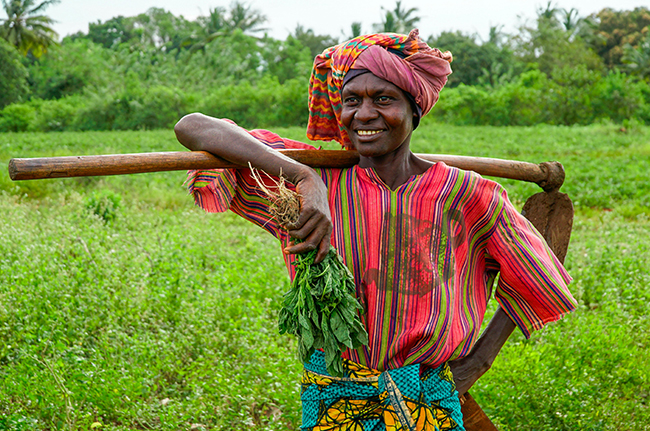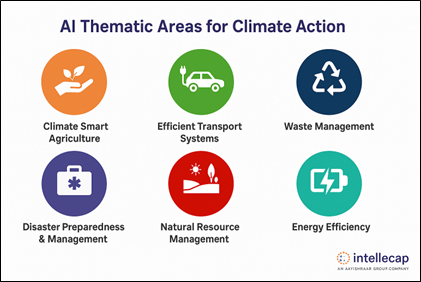AI for Climate Resilience

Situation/Challenge
Climate change is one of the most pressing and complex challenges facing humanity today, driven largely by greenhouse gas emissions from human activities. It leads to long-term shifts in weather patterns and global temperatures. In Africa, the consequences are particularly harsh—rising temperatures and changing rainfall patterns contribute to droughts, desertification, crop failures, and food insecurity. The continent also faces more frequent and intense floods and storms, causing infrastructure damage, displacement, and loss of life. These climate impacts further intensify issues like water scarcity, disease spread, and resource-related conflicts, placing immense pressure on vulnerable communities.
Machine Learning (ML) holds significant promise in addressing climate change through both mitigation and adaptation. For mitigation, ML can optimize energy systems, enhance efficiency, and support the shift to renewable energy. It also plays a role in monitoring and managing high carbon ecosystems like forests. On the adaptation side, ML can improve climate risk assessments, inform resilient planning, and support climate-smart agriculture, water management, and biodiversity conservation. It can also power early warning systems for extreme weather events, helping communities better prepare for and respond to climate-related risks. However, it’s important to recognize ML as a supportive tool that complements broader climate action efforts.
Introduction to the GIZ Innovate Africa Challenge
The GIZ Innovate Africa Challenge (IAC) aimed to address the pressing need for innovative climate action solutions in Africa. With the continent facing significant climate risks, including extreme weather, crop failures, and resource scarcity, the challenge focused on supporting AI-driven solutions that can mitigate these impacts.
The goal was to increase awareness about the potential of emerging technologies like AI in tackling climate-related challenges, foster innovation at the intersection of AI and climate action and strengthen the AI startup ecosystem across Smart Africa Member States, including Ghana, Rwanda, and Kenya.
The Cohort of Global Partners:
FAIR Forward is the GIZ project that promotes the development of open-source AI resources for local development challenges, which can be freely used, shared and innovated on across projects, companies, organizations, and indeed across regions
The Smart Africa Alliance (SAA) is a non-profit organization with a primary focus on fostering socio-economic development across the African continent through the use of ICT.
Climate Change AI facilitates work at the nexus of climate change and machine learning.
Intellecap in Africa was the implementing partner working towards Identifying innovative uses of AI to mitigate the impacts of climate change and/or to support climate adaptation efforts in the African continent, while strengthening the AI and start-up ecosystem.
Key Challenges:
- Language barrier: Some founders, especially from non English-speaking regions like the DRC, struggled with sessions conducted in English.
- Time management: Balancing training with business operations was challenging, especially for AI leads engaged in fieldwork.
- Data privacy concerns: Participants hesitated to share data, particularly those with unpatented AI solutions.
- One-size-fits-all mentorship: This didn’t work; tailored expert matching led to better outcomes.
Our Solution / Process
- Design Phase (Jan–Mar 2024): Developed the foundational documents, including an inception report and concept notes for the call for solutions and partnerships.
- Ideation Phase (Mar–May 2024): Launched the call for AI-based climate action solutions and partnerships, followed by a selection process, bootcamp, and virtual pitch sessions to identify high-potential startups. This selection process also required adherence to strict eligibility criteria being followed:
- Compliance/Legal: The business must be a legally registered for-profit entity in one of the 39 SAA member countries and must have operated for at least 6 months.
- Operations: The solution must be implemented in at least one focus country—Kenya, Rwanda, or Ghana.
- Thematic Area: The solution must address climate change-related themes and incorporate AI technology.

- Incubation Phase (Jun–Nov 2024): Provided intensive training on business and AI, supported proposal development, conducted mock pitches, and selected the final winner through a virtual pitch event.
- Implementation Phase (Dec 2024–May 2025): Supported the winning team with a €50,000 grant to scale their solution, including setting up network infrastructure, developing AI models, and engaging local communities for adoption.
Outcome/Impact
The initiative successfully impacted Eight startups. It culminated in the implementation of the winning solution, Imarika Weatherwise. Listed below are the Top eight solutions:
- Faminga (Rwanda) – AI-powered virtual crop advisor detecting irrigation, pests, and diseases in real-time, supporting local languages.
- NjordFrey – Tech-enabled aquaponic farming combining fish and crops with AI-driven monitoring for high yields.
- Ignitia – Hyper-local tropical weather forecasting via SMS/WhatsApp with 84% accuracy for farmers.
- Vaxus – AI chatbot offering climate disaster alerts, carbon accounting, and farming advice via SMS/app.
- Farmer Lifeline Technologies – Solar-powered AI robots detecting 12,000+ crop pests in 5 seconds at 97.5% accuracy.
- Imarika Weatherwise (Kenya) – IoT-AI weather stations providing real-time agro-advisories via USSD/web apps.
- GreenLeafAI (Kenya) – Handheld IoT device measuring crop nutrients, humidity, and health for precision farming.
- KivuGreen Corporation – Offline-enabled weather forecasts and farming advice via SMS/USSD for illiterate farmers.
Key outcomes included:
- Economic Impact: Increased farmer income through precise weather data, reducing input waste and minimizing losses. Led to 70% Increased income for small-scale farmers
- Social Impact: Empowered 15 million farmers with better climate resilience and improved decision-making capabilities. 80% Increase in adoption of climate smart agricultural practices by scale
- Reduced CO2 emissions and promoted sustainable farming practices across multiple regions.
- Increase awareness for the potential of emerging technologies such as AI to tackle climate change-related challenges.
- Increase the number of actors working at the intersection of AI and climate action.
- Enable an increase in the number of AI for climate action solutions and development of concrete pilot projects in the interest of bringing awareness to AI Technologies and its transformative potential in the 39 Smart Africa Member States.
Key Learnings
- Localization is Key: Tailoring AI tools to specific regional climates significantly improves user adoption and impact.
- Behavioral Shifts Matter: Educating users on the benefits of AI-driven insights is crucial for overcoming resistance.
- Scalable Pricing Models: Affordable subscription pricing can drive widespread adoption and ensure commercial viability.
- Inclusive Solutions: Early integration of accessibility features, such as SMS for low-literacy users, prevents costly adjustments later.
- Collaborative Ecosystem: Strong partnerships and tailored mentorship are critical for AI solutions to thrive in diverse markets.




